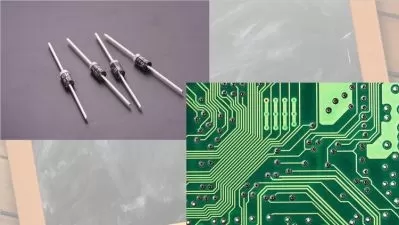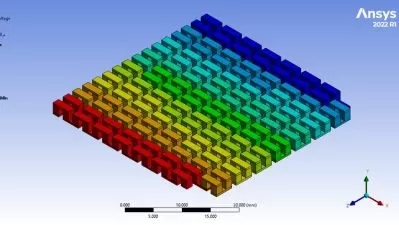Master Digital Electronics Engineering from Scratch
Omkareshwar Jha
25:48:51
Description
Digital electronics covering all semesters in your undergraduate/engineering course
What You'll Learn?
- Science of Digital electronics
- Applications of Digital electronics
- Boolean Algebra
- Logic Gates
- Various electronic machines/devices/instruments
- Karnaugh map simplification
- DC Networks
- AC Networks
- Logic design
- Computer Organization
- Advanced Computer architecture
- Sequential Circuits (intro to memory)
- RAM, ROM, CACHE MEMORY
- CPU memory management
- Basics of Digital & Analogue communication
- Microprocessors
- 8086 architecture
Who is this for?
What You Need to Know?
More details
DescriptionWelcome to Digital electronics course!
This Course is centric to Digital world., how it progressed at tremendous rate the size of computers which was a house itself., fits into your palm.
The progress of Digital electronics is important to learn because this is the platform for all the software development, codes & algorithms. The instructions given to the machine is actually processed by CPU/GPU the way it happen and ultimately gives us the results are only by digital electronics hardware and logic that actually make our performers (codes) be so fast and efficient..
A lousy machine cant take so much of instructions at a given time but its possible today to handle millions of instructions within seconds and that is because of the developments in digital electronics. The journey started from vaccum tubes to transistors and now powerful IC's. We're living in the world of IOT (Internet Of Things) Our devices/instruments/machines works on instructions of softwares (fan, bulb, communication, lights, car's, camera and security etc..)
The knowledge of Digital electronics help us to build a solid foundation in fastest growing technology and most-most centric to human lifestyle.
This course will take you to from the point of the begining and take you through all walks of the development and will land you the the state where you start understanding the machines, powers, signals and Integrated Circuits (IC's)
This will give you a clear understanding of the
"MATHS ~ TECHNOLOGY ~ SCIENCE"
of the Digital electronics., from the point of what's happening inside to the logic which and why's of it, where to use it & how to program it and finally see it working or dancing on the instruction sets you feed into your machine.
We're gonna learn:
1.SemiConductors
2.Logic (Boolean Algebra)
3. Machines/Instruments
4. Electrical Technologies
5. Digital Logic & Design (memory/flipflops)
6. Computer Organization & Architecture
7. Advanced Computer & Architecture
8. Digital & Analogue Communication
9. Microprocessor's (IC's)
10. 8086 Architecture
"Starting from very basics of semiconductors introduction to the point where you start understanding and learning about Integrated circuits is actually a full journey in its own"
You will be completely different before and after!
This course focuses on extensively on Computer Organization and Advanced Computer Architecture here we learn about CPU's, Assemebly language, RAM, ROM, Cache memory etc.. This will gonna build a solid foundation on the subject and helps to understand the computer system and computer technology.
In latter section the focus gets shift in teaching Microprocessors and give a foundational knowledge about this exciting subject. 8086 Architeture and its comparision with 8085.
This course is focused and made by keeping in mind that you're starting as complete beginner thats why the emphasis of each section is to cover all the basics and along with that section wise notes and short quiz at the end of each section is provided so that you can check your progress and can revise at each level (section) and then only proceed to the next level.
Any doubts in anywhere can be asked in QnA community (your mate learner's) & me(your instructor) are more then happy to be the part of your journey and to help you along the way. This will make this digital electronics course more interactive and alive. I will add answers from my side on regular intervals to help you along the way of learning.
I think "This is the great starting point for your digital electronics" career to take of even if you're enthusiast this will make your basics solid & you will start understanding what's actually happening inside the devices you see everyday!
Happy learning to you & i wish you the great future ahead!
Who this course is for:
- Engineers and Scientists
- Computer Science engineering
- Digital electronics engineers
- Electronics engineering
- Engineering minds
- Anyone who wants to learn IOT
- Science Student
Welcome to Digital electronics course!
This Course is centric to Digital world., how it progressed at tremendous rate the size of computers which was a house itself., fits into your palm.
The progress of Digital electronics is important to learn because this is the platform for all the software development, codes & algorithms. The instructions given to the machine is actually processed by CPU/GPU the way it happen and ultimately gives us the results are only by digital electronics hardware and logic that actually make our performers (codes) be so fast and efficient..
A lousy machine cant take so much of instructions at a given time but its possible today to handle millions of instructions within seconds and that is because of the developments in digital electronics. The journey started from vaccum tubes to transistors and now powerful IC's. We're living in the world of IOT (Internet Of Things) Our devices/instruments/machines works on instructions of softwares (fan, bulb, communication, lights, car's, camera and security etc..)
The knowledge of Digital electronics help us to build a solid foundation in fastest growing technology and most-most centric to human lifestyle.
This course will take you to from the point of the begining and take you through all walks of the development and will land you the the state where you start understanding the machines, powers, signals and Integrated Circuits (IC's)
This will give you a clear understanding of the
"MATHS ~ TECHNOLOGY ~ SCIENCE"
of the Digital electronics., from the point of what's happening inside to the logic which and why's of it, where to use it & how to program it and finally see it working or dancing on the instruction sets you feed into your machine.
We're gonna learn:
1.SemiConductors
2.Logic (Boolean Algebra)
3. Machines/Instruments
4. Electrical Technologies
5. Digital Logic & Design (memory/flipflops)
6. Computer Organization & Architecture
7. Advanced Computer & Architecture
8. Digital & Analogue Communication
9. Microprocessor's (IC's)
10. 8086 Architecture
"Starting from very basics of semiconductors introduction to the point where you start understanding and learning about Integrated circuits is actually a full journey in its own"
You will be completely different before and after!
This course focuses on extensively on Computer Organization and Advanced Computer Architecture here we learn about CPU's, Assemebly language, RAM, ROM, Cache memory etc.. This will gonna build a solid foundation on the subject and helps to understand the computer system and computer technology.
In latter section the focus gets shift in teaching Microprocessors and give a foundational knowledge about this exciting subject. 8086 Architeture and its comparision with 8085.
This course is focused and made by keeping in mind that you're starting as complete beginner thats why the emphasis of each section is to cover all the basics and along with that section wise notes and short quiz at the end of each section is provided so that you can check your progress and can revise at each level (section) and then only proceed to the next level.
Any doubts in anywhere can be asked in QnA community (your mate learner's) & me(your instructor) are more then happy to be the part of your journey and to help you along the way. This will make this digital electronics course more interactive and alive. I will add answers from my side on regular intervals to help you along the way of learning.
I think "This is the great starting point for your digital electronics" career to take of even if you're enthusiast this will make your basics solid & you will start understanding what's actually happening inside the devices you see everyday!
Happy learning to you & i wish you the great future ahead!
Who this course is for:
- Engineers and Scientists
- Computer Science engineering
- Digital electronics engineers
- Electronics engineering
- Engineering minds
- Anyone who wants to learn IOT
- Science Student
User Reviews
Rating
Omkareshwar Jha
Instructor's Courses
Udemy
View courses Udemy- language english
- Training sessions 105
- duration 25:48:51
- English subtitles has
- Release Date 2023/09/10











